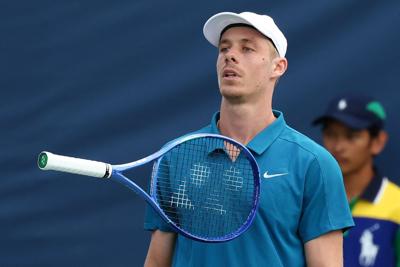Set 4, Game 4, 15-30, Denis Shapovalov serving against Valentin Royer. And it went like this:
30-30 (ace), 30-40 (double fault), deuce, advantage Shapovalov, deuce, advantage Royer, deuce (ace), advantage Shapovalov (ace), deuce (double fault), advantage Royer, deuce (ace), advantage Shapovalov (ace), deuce (double fault), advantage Shapovalov (ace), hold (Royer returns long).
A game that went to deuce six times, with Shapovalov racking up six aces and three double faults.
Get the picture?
Because the three-hour, 36-minute second-round match at the U.S. Open was no walk in the Flushing Meadows park for the Canadian over the wild-card Frenchman.
Shapovalov had moments of brilliance but also moments of waywardness in a 7-6 (6), 3-6, 7-6 (4), 6-3 encounter, advancing to the third round in Queens for the first time since 2022, territory familiar to Shapovalov because he did it on six straight occasions previously. With his 17th match win at this Grand Slam, he overtook Milos Raonic in that column for the most by a Canadian.
It was a most satisfying day at the office for the 27th-seeded Shapovalov. And for all the laborious effort — Shapovalov outwardly was more self-contained than usual, apart from some points-appropriate roars — the 26-year-old from Richmond Hill gets to face world No. 1 Jannik Sinner in the next round.
Shapovalov took out the Italian in a thriller at the Australian Open four years ago, but that wasn’t the Sinner of today. “I believe I won in five, in the end,’’ Shapovalov recalled correctly. “Definitely a great match to look back on, but of course a lot has changed. I think Jannik has improved tremendously since that and I believe so have I.
“Definitely looking forward to another matchup with him.’’
That formidable challenge dominated the post-match press conference. “He’s got a lot of strengths, being the player that he is,’’ Shapovalov observed. “He doesn’t have many weaknesses’’
The southpaw is coming off a title in Los Cabos last month, Shapovalov’s fourth career title and his third in under a year. Recurring knee woes — a patellar tendon tear and tendinitis in his left knee — sidelined him for six months last season, causing a steep drop in the rankings for someone who got to No. 10 in 2020 after reaching the quarterfinals in New York.
There were periods of doubt when he wondered if he would ever be able to play again and play pain-free.
“I had to stay very, very patient last year. I only got the result I wanted the last week of the year with winning Belgrade. Honestly, that title meant 100 times more to me than the first title that I won in Stockholm. It was huge for me.’’
It also launched the pivot back up the rankings. He now sits 29th.
“It’s never easy to climb back in the rankings. There’s a lot of new, young guys coming up. Your name is not as fearful as when you’re 10 in the world.’’
In Thursday’s duel, with two tiebreaks, Shapovalov hit 71 winners and won 82 per cent of first-serve points. But he was almost undone by 43 unforced errors and was broken five times. His own sixth break, however, came on match point.
It was enough to be going on with, undeterred by having to contend with the top tennis player on the planet.
“I would say my confidence is very high. Different than when I was young and the confidence would be high but it would be pretty fragile.’’
Shapovalov was followed onto Court 7 by compatriot Gabriel Diallo, seeded for the first time at a Slam. But the 23-year-old from Montreal couldn’t make it 2-for-2 for Canada against the unseeded Jaume Munar from Spain, ousted in straight sets 7-5, 6-3, 7-5.
After dropping the first two sets, Diallo tried to rally and seemed to have gained momentum, breaking back and levelling at 4-4. But unforced errors, 49 in total, sent him off the rails. He was broken again in the 11th game and looking very dispirited as the Spaniard closed out to love at the 2:47 mark.
In a late match, Félix Auger-Aliassime raced out to a 6-1 opening set against unseeded opponent Roman Safiullin, then had to fend off half a dozen set points and survive two tiebreaks to win 6-1, 7-6 (4), 7-6 (5).
The 25-year-old from Montreal, seeded 25th, faced and lost his first break point in the third game of the third but retrieved it three games later, drawing even at 3-3 in front of a audibly pro-Canadian crowd. He went on to win just under three hours.
For sheer entertainment, though, the feature of Day 5 was Canadian Leylah Fernandez yoked with tennis goddess Venus Williams in the first doubles round. Williams is 45 and hadn’t played doubles in more than a decade until last month in Washington D.C. Fernandez, who had a magical run to the women’s singles final at the U.S. Open three years ago, is 22.
The native of Laval, Que., was over the moon when Williams called to ask if she’d like to partner her. “I was like a kid on Christmas Day, just jumping around. I was so happy. I don’t think I stopped smiling for the whole night and even in the morning.’’
The unlikely duo dispatched No. 6-seeded tandem Lyudmyla Kichenok of Ukraine and Ellen Perez of Australia 7-6(4), 6-3. After which Fernandez urged Williams to perform her signature twirl for the adoring crowd. Which she did.
Then Williams paid Fernandez a compliment she’ll never forget: “The best partner I ever played with … outside of Serena.’’






























To join the conversation set a first and last name in your user profile.
Sign in or register for free to join the Conversation